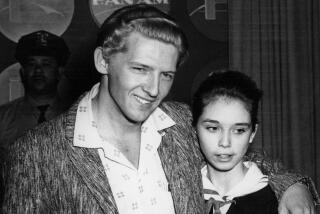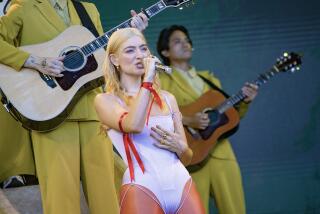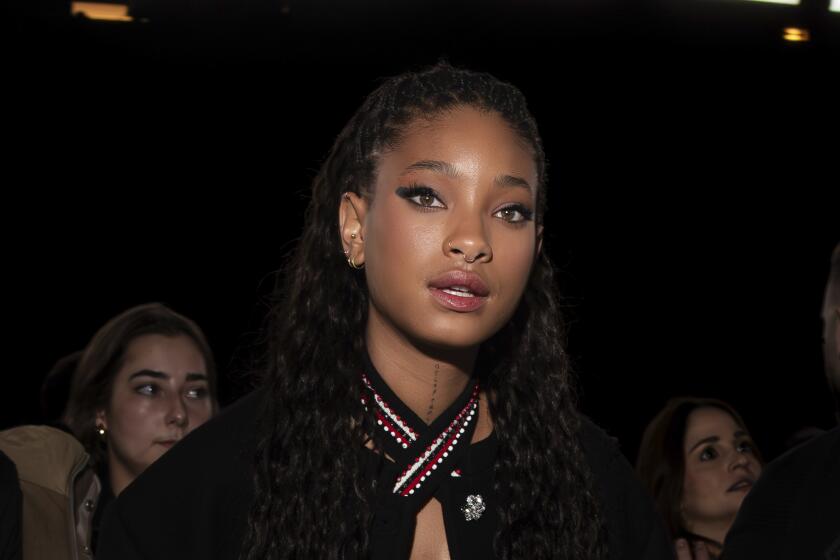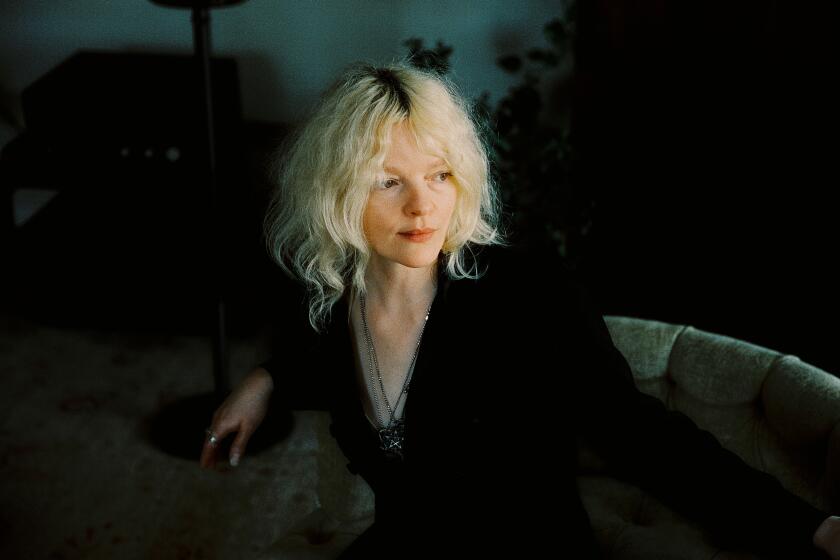Radiohead Comes In Crisp, Loud and Clear
In a video age where so many promising recording artists fail to live up to expectations in concert, it’s a joy to see a band gloriously exceed them.
And it wasn’t modest expectations that Radiohead faced when the band stepped on stage Wednesday at the Universal Amphitheatre in front of a star-studded audience that included such pop and film celebrities as Alanis Morissette and Brad Pitt.
Not only was the English quintet named the best rock group of 1997 in numerous U.S. and British publications, but its “OK Computer” was a nominee for the album of the year Grammy.
Like most artists of value in rock, the band has excellent instincts about how to present its music on stage. The two things most often cited about Radiohead in all the glowing reviews are: a) the music is built around brilliant musical textures; and b) somehow its talents all finally blossomed in “OK Computer.”
By the time the group left the stage, however, it had demonstrated that its music, for all the instrumental embroidery, is rooted in exquisite songwriting, and that its 1995 album “The Bends,” which was largely overlooked in this country, is a collection of power and passion--almost the equal of “OK Computer.”
Radiohead made the first point Wednesday when Thom Yorke began singing the slow, darkly pained “Exit Music (For a Film),” accompanied only by his own acoustic guitar. Though the other musicians had joined him by the end of the number, which is from “OK Computer,” the opening lines--sung in his intense, deliberate style--showcased the beautifully crafted lyrics and melody.
It was a marvelous way to begin the program and an excellent introduction to the moody, demanding album, and it was easy to assume that the group would continue parading one “OK Computer” song after another as a way to celebrate its 1997 success.
And the band did deliver several songs from the album during the nearly two-hour program, including the equally bleak “Paranoid Android” and the more vigorous “Karma Police.”
Yet the band gave equally prominent placement to material from “The Bends”--and the older songs, including the biting “Fake Plastic Trees” and the stinging, disillusioned “My Iron Lung,” meshed well with the newer ones.
If anyone else played or arranged these songs, the results would probably be impressive. But this band--which also includes brothers Jonny and Colin Greenwood on lead guitar and bass, respectively, guitarist Ed O’Brien and drummer Phil Selway--frames the songs with textures that produce an almost symphonic sheen.
Instrumentally, the band above all reminds one of the wonders of the guitar. Rather than simply use rock’s most popular instrument for conventional energy and punctuation, Greenwood, especially, delivers notes of genuine beauty as well as stunning power. Remarkably, Yorke matches that range vocally time after time. He’s got both the aggression of punk and the ethereal grace of the most absorbing art-rock, freely sacrificing the clarity of a word or a line for its emotional truth.
Radiohead’s strength also rests in Yorke’s distinctive outlook. Most of the significant rock in the ‘90s has explored interior landscapes. From Kurt Cobain to Trent Reznor, the focus has been on personal alienation and despair. Yorke touches on these matters, but he more often tends to look outside himself.
Where Bob Dylan, in his most celebrated ‘60s work, looked at a decaying society through the eyes of a confident and idealistic new generation, Yorke sees a world that is so directionless in its search for values and purpose that it is uncertain about where to put its faith.
When he sings the line, “I wish it was the ‘60s” in the song “The Bends,” Yorke seems to be both longing for the commitment and community that characterized that decade and mocking those who worship the era rather than finding their own ideas today.
His is a rich, wide-ranging and provocative theme that fits perfectly the alternating ache, anger and allure of the band’s musical patterns.
In a time when rock seems equally directionless in its search for new heroes, Radiohead emerges as a solid anchor. “Godhead!” one fan in the audience screamed with enthusiasm near the end of the concert, and it was the kind of superlative that was appropriate on this night.
Spiritualized, which opened the show, is another highly regarded British band, though its rewards fall far short of such rivals as Radiohead, the Verve and Oasis. The ebb and flow of the sextet’s frequently lengthy moodscapes can be seductive on record and in moments live, but there seemed something unfinished--and a bit too familiar--about much of its playing Wednesday.
More to Read
The biggest entertainment stories
Get our big stories about Hollywood, film, television, music, arts, culture and more right in your inbox as soon as they publish.
You may occasionally receive promotional content from the Los Angeles Times.






